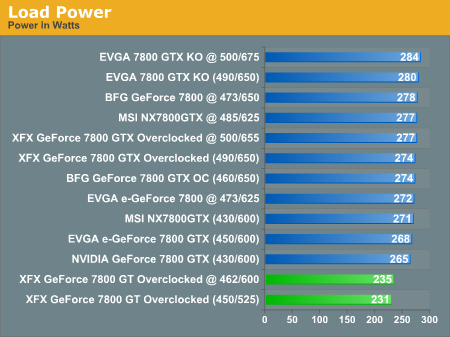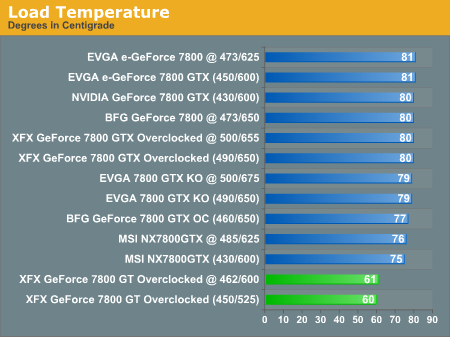Power, Heat & Noise
Power

Considering how power-hungry some of the GTXs were, we were curious to know how this would look on the 7800 GT. As we've found with the 7800 GTXs, there's a lot of variation in heat and power load between the different vendor cards, and the same will likely be true here. As the chart shows, the 7800 GT doesn't create nearly the same kind of power draw that the different GTXs do. We get a draw of 231 W running stress tests at the factory-clock speed of 450MHz, and 235 W when overclocked. While this is lower than the GTX, unfortunately, it's not low enough to let you skimp on your power supply.
For reference, the system load was 125 W while idle. This is about 20 W lower than idle under the GTX.
Heat

We found that this 7800 GT ran considerably cooler than the GTX, and we're curious to see if this will be similar with other 7800 GTs. The load temperature of a card can be important because of the part that it plays in overclocking. It's also something to consider if you live in very hot climates or have small computer cases with poor circulation. With a temperature of 60 degrees C at 450MHz and 61 degrees C at 462MHz, this card handles heat pretty well. We'll see if XFX is unique in this among other GT vendors, or if they all generally run this much cooler than the GTX.
Noise
With the 7800 GTX, there didn't seem to be much of a correlation between higher clock speeds and noise levels as we might have guessed. One of the highest clocked GTXs,
the EVGA e-Geforce 7800 GTX KO, was also the least noisy according to our numbers, but this is likely because of the metal fan casing, which encompassed the entire front of the card. We've found that with the GTX, the CPU fan is the predominant noise in the room when testing, which makes it practically impossible to try to distinguish differences in fan noise between the cards by ear.

Until now, that is. As it turns out, we were quite surprised by how loud this card proved to be. In fact, the card was so noisy when we started up the system that it effectively drowned out the CPU fan. While we weren't expecting the GT to get a noise level quite as loud as the GTX, our tests revealed a sound level of 54.7 for the GT, about two and a half times louder than any of the 7800 GTXs that we tested. This might well be a big negative for some people looking at this card, but keep in mind that hearing is subjective, and many people won't notice or mind the extra sound at all. Of course, we're very interested to see if this level of noise is common among the vendor 7800 GTs, and we'll have something to which to compare it for the next article. The higher noise levels could also play a large part in the significantly lower temperatures.













33 Comments
View All Comments
KayKay - Tuesday, August 30, 2005 - link
I had made up my mind well before this article, but it pretty much seals the deal for me now. definitely going with this video cardg33k - Tuesday, August 30, 2005 - link
How do I know if this is a worthy upgrade from a 6800ultra? How much of a percentage increase would I see?GhandiInstinct - Tuesday, August 30, 2005 - link
It's not, as for percentage increase, you know there are about a hundred or more benchmarks on this card all over the internet, if you care to even look.If you have an ultra, the 7800 won't make your games that much better looking, if you're concerned about future games, wait for more next-gen gpu offerings.